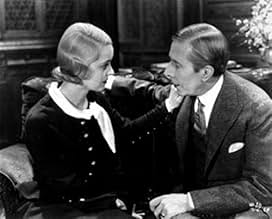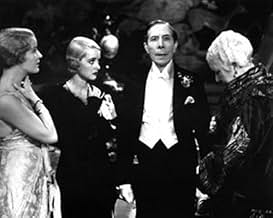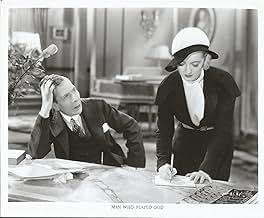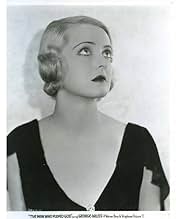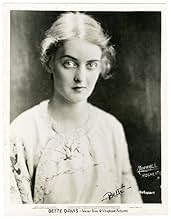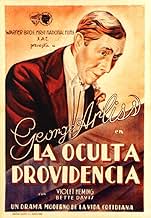IMDb-BEWERTUNG
6,8/10
1350
IHRE BEWERTUNG
Füge eine Handlung in deiner Sprache hinzuAfter losing his hearing, a musician uses lip-reading to help others.After losing his hearing, a musician uses lip-reading to help others.After losing his hearing, a musician uses lip-reading to help others.
- Auszeichnungen
- 1 wins total
George Arliss
- Montgomery Royle
- (as Mr. George Arliss)
André Luguet
- The King
- (as Andre Luguet)
Ivan F. Simpson
- Battle
- (as Ivan Simpson)
Charles E. Evans
- The Doctor
- (as Charles Evans)
Fred Howard
- Man
- (Gelöschte Szenen)
Symona Boniface
- Woman in Audience
- (Nicht genannt)
Wade Boteler
- Detective
- (Nicht genannt)
Elspeth Dudgeon
- Would-Be Ticket Buyer
- (Nicht genannt)
Grace Durkin
- Kit - First Girl
- (Nicht genannt)
Helena Phillips Evans
- Music Fan with Boy
- (Nicht genannt)
Empfohlene Bewertungen
In "The Man Who Played God" the venerable George Arliss plays a famous and sweet-natured concert pianist who must cope with catastrophic hearing loss. There are two male-female romantic love subplots, but the story is essentially about philosophical and moral issues. The movie is best remembered not for Arliss, who was the main attraction, but for a supporting role beautifully played by the future screen queen Bette Davis, who for the most part is also very well photographed by James Van Trees, enhancing her unique presence. Amusingly, Mordaunt Hall of The New York Times in his review of the film faulted her for speaking "too rapidly for the microphone." But Arliss himself, as an artist suddenly forced to reconstruct his whole approach to life, is sympathetic and compelling despite the lipstick he habitually wore, in the style of many male actors of that time. He is ably supported by a thoroughly winning cast including Violet Heming, Ivan Simpson, Louise Closser Hale in an uncharacteristically non-dour role as the pianist's loving, intelligent and supportive sister, and even a very young Ray Milland as half of a distressed young couple whose desperate utterances are deciphered from afar by Arliss with the aid of binoculars and freshly acquired lip-reading skills. The studio-created ambiance of bustling city streets, whether "Paris" or "New York," is less phony looking than the usual replications thanks to careful lighting and well-planned camera angles.
This story has been made and remade many times. The first was back in the 1910s as "The Silent Voice". Then, a decade later, George Arliss made "The Man Who Played God"...and then again, a decade after this, Arliss made a sound version. But that wasn't all...in the 1950s, Liberace made "Sincerely Yours"...yet another version of this story!
The story is about a world famous concert pianist (Arliss), a man who is beloved and loves life. He also has a significantly younger woman (Bette Davis) who wants to marry him. But in spite of this, his life takes a sour turn when he is deafened...and sour is the word for it! This is because the pianist soon becomes bitter and resentful from his hearing loss and he spends much of his time brooding. So what is his salvation? See the movie.
Arliss, as usual, is very good. And, the story is a wonderful tale about loss and coping with it. My only complaint, and it's a minor one, is that the story seems a tad old fashioned. Now this does NOT mean I suggest you see the later Liberace version...it's not particularly good. But the 1932 film is well worth seeing...with a great object lesson for us all.
By the way, late in the film look carefully at the minor character of an embezzler...it's played by the soon to be discovered Ray Milland.
The story is about a world famous concert pianist (Arliss), a man who is beloved and loves life. He also has a significantly younger woman (Bette Davis) who wants to marry him. But in spite of this, his life takes a sour turn when he is deafened...and sour is the word for it! This is because the pianist soon becomes bitter and resentful from his hearing loss and he spends much of his time brooding. So what is his salvation? See the movie.
Arliss, as usual, is very good. And, the story is a wonderful tale about loss and coping with it. My only complaint, and it's a minor one, is that the story seems a tad old fashioned. Now this does NOT mean I suggest you see the later Liberace version...it's not particularly good. But the 1932 film is well worth seeing...with a great object lesson for us all.
By the way, late in the film look carefully at the minor character of an embezzler...it's played by the soon to be discovered Ray Milland.
THE MAN WHO PLAYED GOD (Warner Brothers, 1932), directed by John G. Adolfi, from a short story by Gouverneur Morris, stars Academy Award winning actor of 1929s DISRAELI, Mr. George Arliss, in a remake to his 1922 silent screen adaptation. Essentially a showcase for the prestigious Arliss in what might have been just another movie assignment to his credit, it's best known as the motion picture responsible for the advancement of Bette Davis in her first important screen role, following her start at Universal in 1931, thus the beginning of her long association at the Warner studio where she would become its major star attraction before the end of the decade.
Of the George Arliss films in circulation and video today, THE MAN WHO PLAYED GOD holds up remarkably well mainly due to its theme and timely message that never really grows out of date, overlooking the fact that such a story echoes passages from the Holy Bible ("A man who has never suffered has never lived," "If you kill yourself, you'll suffer ten thousand times more" or the age old question, "If God is so merciful, how could he allow this to happen to me?") preached during Sunday services. The title has nothing to do with a actor starring in a religious play, but in fact, about a man whose life becomes an "empty shell" only to change from being a troubled soul after losing his hearing to forgetting his bitterness by helping others. While much of the Arliss movies produced at Warners during the early 1930s were extremely popular, most consist of too much dialog and lack of motion to stir up interest. THE MAN WHO PLAYED GOD is one of those few that doesn't fall into that category thanks to its fine direction, screenplay and supporting players.
The story opens in Paris where 50-year-old Montgomery Royal (George Arliss), a concert pianist, engaged to his protégé, Grace Blaine (Bette Davis), a girl more than half his age, agrees to give a private backstage recital for a monarch. During a performance, an anarchist, intending to assassinate the King (Andre Luguet), explodes a bomb. While everyone has escaped injury, Monty becomes stone deaf. Monte returns to his New York City apartment where he finds it difficult to adjust to his world of silence. He becomes bitter, hating God to a point of canceling his order for an organ he was going to donate to a church in memory of his deaf and religious mother, Margaret Ruth Royal. Without the ability to hear what's precious to him, his music, and becomes an embittered recluse. Coming to the point of suicide by nearly jumping from the window, his loyal butler Battle (Ivan Simpson) saves him in time from eternal suffering by offering him something to occupy his time. Having been taught lip reading, he takes binoculars to spy on people across the street in Central Park, reads their lips, learning of their troubles, and becoming a sort of guardian angel in helping those in desperate need without revealing himself. Finding he now has a purpose in life, he must face another greater challenge involving the loyalty of young Grace.
The supporting cast consists Donald Cook as Harold Van Adam; Louise Closser Hale as Monty's sister, Florence; Oscar Apfel as the Lip Reading Teacher; Paul Porcasi as the Concert Manager; with Hedda Hopper, Murray Kinnell and the unbilled Ray Milland. Of the supporting players, second billed Violet Heming appears to be the least familiar, yet in a role that nearly surpasses the one given by Bette Davis. Her sophisticated mannerisms come close to that of the better known Verree Teasdale, as a widow who secretly loves Monty, in spite of his engagement to another. The Bette Davis trademark is not too much evident at this point, in fact, having the make-up department giving Davis the Constance Bennett manner. Davis would be paired with Arliss one more time in the rarely seen comedy, THE WORKING MAN (1933).
In the midst of horror melodramas, gangsters and pre-code sex dramas playing in theaters at the height of the great depression, THE MAN WHO PLAYED GOD comes as a sort of inspirational drama that offers hope to those who have given up on life, with the moral of the story being, "The Lord works in mysterious ways." Remade by Warners as SINCERELY YOURS (1955) with TV personality Liberace in the role originated by Arliss, whose piano playing served him better than his acting, the latest screen adaptation, that should have improved over the old, didn't, making this 1932 version the one worth viewing. THE MAN WHO PLAYED GOD, which has never been distributed to video cassette or DVD, can be seen on Turner Classic Movies. (***)
Of the George Arliss films in circulation and video today, THE MAN WHO PLAYED GOD holds up remarkably well mainly due to its theme and timely message that never really grows out of date, overlooking the fact that such a story echoes passages from the Holy Bible ("A man who has never suffered has never lived," "If you kill yourself, you'll suffer ten thousand times more" or the age old question, "If God is so merciful, how could he allow this to happen to me?") preached during Sunday services. The title has nothing to do with a actor starring in a religious play, but in fact, about a man whose life becomes an "empty shell" only to change from being a troubled soul after losing his hearing to forgetting his bitterness by helping others. While much of the Arliss movies produced at Warners during the early 1930s were extremely popular, most consist of too much dialog and lack of motion to stir up interest. THE MAN WHO PLAYED GOD is one of those few that doesn't fall into that category thanks to its fine direction, screenplay and supporting players.
The story opens in Paris where 50-year-old Montgomery Royal (George Arliss), a concert pianist, engaged to his protégé, Grace Blaine (Bette Davis), a girl more than half his age, agrees to give a private backstage recital for a monarch. During a performance, an anarchist, intending to assassinate the King (Andre Luguet), explodes a bomb. While everyone has escaped injury, Monty becomes stone deaf. Monte returns to his New York City apartment where he finds it difficult to adjust to his world of silence. He becomes bitter, hating God to a point of canceling his order for an organ he was going to donate to a church in memory of his deaf and religious mother, Margaret Ruth Royal. Without the ability to hear what's precious to him, his music, and becomes an embittered recluse. Coming to the point of suicide by nearly jumping from the window, his loyal butler Battle (Ivan Simpson) saves him in time from eternal suffering by offering him something to occupy his time. Having been taught lip reading, he takes binoculars to spy on people across the street in Central Park, reads their lips, learning of their troubles, and becoming a sort of guardian angel in helping those in desperate need without revealing himself. Finding he now has a purpose in life, he must face another greater challenge involving the loyalty of young Grace.
The supporting cast consists Donald Cook as Harold Van Adam; Louise Closser Hale as Monty's sister, Florence; Oscar Apfel as the Lip Reading Teacher; Paul Porcasi as the Concert Manager; with Hedda Hopper, Murray Kinnell and the unbilled Ray Milland. Of the supporting players, second billed Violet Heming appears to be the least familiar, yet in a role that nearly surpasses the one given by Bette Davis. Her sophisticated mannerisms come close to that of the better known Verree Teasdale, as a widow who secretly loves Monty, in spite of his engagement to another. The Bette Davis trademark is not too much evident at this point, in fact, having the make-up department giving Davis the Constance Bennett manner. Davis would be paired with Arliss one more time in the rarely seen comedy, THE WORKING MAN (1933).
In the midst of horror melodramas, gangsters and pre-code sex dramas playing in theaters at the height of the great depression, THE MAN WHO PLAYED GOD comes as a sort of inspirational drama that offers hope to those who have given up on life, with the moral of the story being, "The Lord works in mysterious ways." Remade by Warners as SINCERELY YOURS (1955) with TV personality Liberace in the role originated by Arliss, whose piano playing served him better than his acting, the latest screen adaptation, that should have improved over the old, didn't, making this 1932 version the one worth viewing. THE MAN WHO PLAYED GOD, which has never been distributed to video cassette or DVD, can be seen on Turner Classic Movies. (***)
In 1932 many actors were still rather new to sound pictures and the great majority of them were theatre trained and while some would stay on in Hollywood, many would return to the stage to stay. Bette Davis was a young actress in the midst of making that decision to aty in Hollywood or return to New York and the stage. She had made several low buget pictures, but things just were not clicking for her. The success of this movie and the attention she received convinced her to stay on and make movies and we are all thankful for that. George Arliss was a grand old man of the stage and his artistry is well portrayed here. His makeup is a little heavy, making him look a little like the Phantom of The Opera with lipstick and darkened nostrils, but soon you get beyond that. The acting is almost strictly stage-style here, this MUST have been a play before it was filmed. The blocking and angles of the actors and the way they seem to talk "at" each other rather than to each other shows the stage acting. Great story, nice escapism... who wouldnt like to help others? We can do that through George Arliss in this movie.
An aging & celebrated concert pianist completely loses his hearing, and with it his faith in The Almighty. After learning to lip read, he realizes he can once again enter into people's lives, alleviating the misfortunes of total strangers. With this much power to do good, he becomes THE MAN WHO PLAYED GOD.
Although sadly neglected today, George Arliss was one of the very greatest of film actors of the 1930's. His art was consummate - a whole volume of emotion could be conveyed by the slightest movement of face or posture. He gives a wonderful performance here as a man torn from what he loves the most, blaming God for it and eventually finding peace.
A splendid actress of the same period, Louise Closser Hale gives quiet dignity to the role of Arliss' sister. As his protégé, young Bette Davis does a fine job; she always considered this to be her first film role of substance. Ivan F. Simpson is excellent as a very loyal butler. Hedda Hopper has a tiny role as a woman at a picnic & look for an uncredited Ray Milland as a young man in Central Park attempting suicide.
Although sadly neglected today, George Arliss was one of the very greatest of film actors of the 1930's. His art was consummate - a whole volume of emotion could be conveyed by the slightest movement of face or posture. He gives a wonderful performance here as a man torn from what he loves the most, blaming God for it and eventually finding peace.
A splendid actress of the same period, Louise Closser Hale gives quiet dignity to the role of Arliss' sister. As his protégé, young Bette Davis does a fine job; she always considered this to be her first film role of substance. Ivan F. Simpson is excellent as a very loyal butler. Hedda Hopper has a tiny role as a woman at a picnic & look for an uncredited Ray Milland as a young man in Central Park attempting suicide.
Wusstest du schon
- WissenswertesThis was the first movie Bette Davis made under her contract to Warner Bros., the studio under which she did most of her best-known work of the 1930s and '40s. Her earlier six films were made for various studios, (including Universal, RKO and Columbia) all of which let her go.
- PatzerWhen Royle goes to his desk after observing the couple in the park, the shadow of the boom microphone dips onto the window curtain behind him.
- Zitate
Grace Blair: You're my ideal!
Montgomery Royle: I shall always be... your friend.
- VerbindungenFeatured in Hollywood: The Great Stars (1963)
- SoundtracksFantaisie-Impromptu in C sharp minor, Op. 66
(1834) (uncredited)
Written by Frédéric Chopin
Played on piano by George Arliss (dubbed by Salvatore Santaella) at the concert
Top-Auswahl
Melde dich zum Bewerten an und greife auf die Watchlist für personalisierte Empfehlungen zu.
Details
- Erscheinungsdatum
- Herkunftsland
- Sprachen
- Auch bekannt als
- Covek koji se dopao Bogu
- Drehorte
- Produktionsfirma
- Weitere beteiligte Unternehmen bei IMDbPro anzeigen
Box Office
- Budget
- 237.000 $ (geschätzt)
- Laufzeit1 Stunde 20 Minuten
- Farbe
- Sound-Mix
- Seitenverhältnis
- 1.37 : 1
Zu dieser Seite beitragen
Bearbeitung vorschlagen oder fehlenden Inhalt hinzufügen

Oberste Lücke
By what name was The Man Who Played God (1932) officially released in India in English?
Antwort
